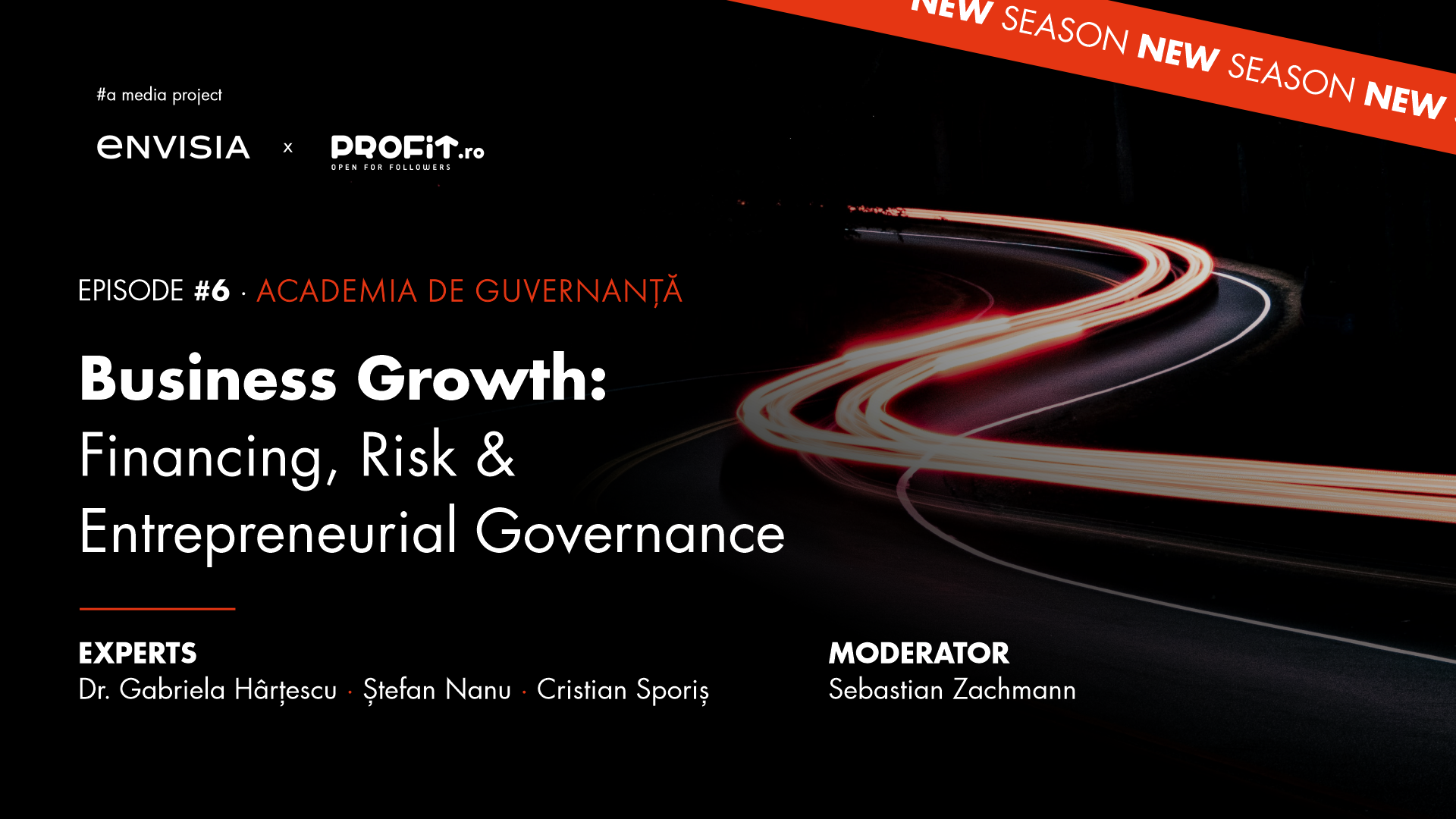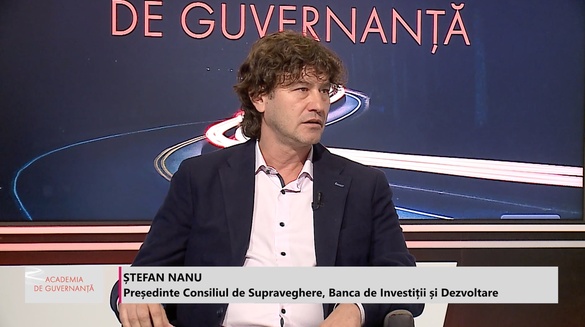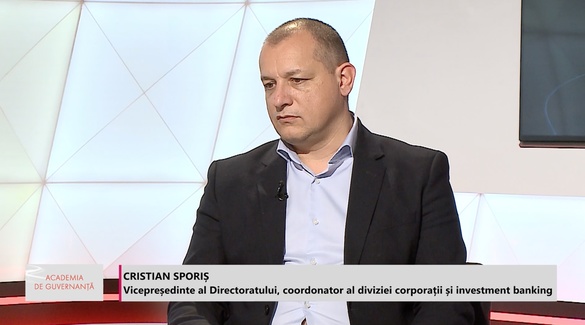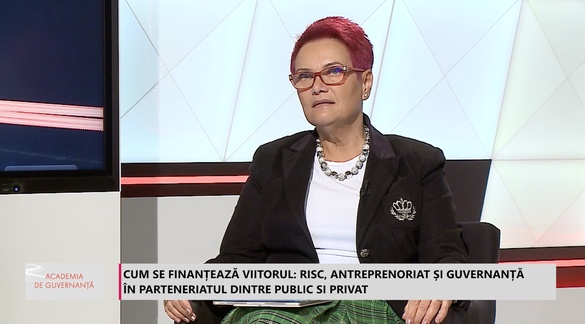Governance Education is a Continuous Process. How to Learn Better Decision Making When No One Tells You You're Wrong?

In a world where leadership decisions can alter markets, governance education is no longer a one-time milestone—it’s a continuous learning process for every board. In Romania, the lack of formal governance, dependence on founders, and limited succession planning remain major weaknesses of privately held companies. Experts agree that continuous governance education is essential to building better decision-making boards, capable of adapting to complex, dynamic financial and ethical realities.
The latest edition of Academia de Guvernanță – a media project developed by Envisia – Business School, Profit.ro, and Prima News – explored a critical theme for Romania’s economic future: How to Finance the Future – the Balance between Risk, Entrepreneurship, and Governance in Public-Private Partnerships. The discussion brought together Dr. Gabriela Hârțescu, Dean and Founding Member of Envisia; Ștefan Nanu, Chairman of the Supervisory Board of the Bank for Investment and Development (BID); and Cristian Sporiș, Vice President of Raiffeisen Bank Romania’s Management Board. The conversation, moderated by journalist Sebastian Zachmann, connected insights from education, finance, and public policy, highlighting why governance education and continuous learning at board level are essential for making better decisions and sustaining investor trust.
The Trust Equation: Effective Governance and Investor Confidence
Ștefan Nanu, Chairman of the Supervisory Board of the Bank for Investment and Development (BID), emphasized the direct link between effective governance, investor confidence and consistent access to capital:
“Founders and managers need to learn from mistakes and adapt their governance models so they can access financing and cheaper instruments. There are more and more advantageous European tools with subsidized interest rates that are lost if you don’t understand the need for governance, internal control mechanisms, and transparency.”

He explained that 80% of Romanian SMEs depend on internal financing, limiting their competitiveness and growth potential—an issue that directly affects risk perception among investors and the ability of companies to attract sustainable funding.
According to Cristian Sporiș, Vice President of Raiffeisen Bank, banks assess companies based on internal ratings and sector benchmarks to identify gaps and guide their development:
“Every client in the bank has a rating. Then we look at the leverage effect – how indebted a company is compared to its capacity to generate profit. With a large database of rated companies clustered by sector, we can see the benchmark, identify the top performer, and then measure the gap against it. In discussions with clients willing to listen, we can show them the steps needed to close that gap.”
Sporiș also stressed the essential role of financial education, the presence of a CFO, and management accounting in helping companies move beyond a simple cash-flow-based approach toward a structure that supports investor confidence in governance.
Expert Voices on Financer's Criteria (The "Say Yes" Factors)
When discussing access to financing, Cristian Sporiș advises entrepreneurs to select the right financial products and avoid funding long-term investments with short-term credit:
“The biggest mistakes occur when medium- or long-term investments are financed with short-term funding. It’s crucial to pay attention to company liquidity – to maintain a strong liquidity position so that if things improve, it can be used for investment, and if they don’t, it helps the company weather cash-flow stress.”
Ștefan Nanu added that planning and prudence should guide every company, regardless of its stage of development.
“You need to have a plan, even as a startup, because you can’t sell your idea without one. If you want access to financing, every instrument available on the market includes governance requirements,” he said, noting that BID collaborates with commercial banks through portfolio guarantees and continues monitoring projects after financing ends to assess multiplier effects and real economic value creation.
Dr. Gabriela Hârțescu, Dean and Founding Member of Envisia, underlined how governance shapes the perception of value in the eyes of investors:
“The existence of a board shows that the business is institutionalized. For potential buyers, governance proves that they’re not purchasing a company tied to one person, but one based on processes and rules. The trust generated by strong governance multiplies a company’s value.”
From Experience to Rigor: The Imperative of Board Professionalization
According to Dr. Gabriela Hârțescu, the three biggest mistakes made by Romanian entrepreneurs are the lack of formal governance, neglecting succession planning, and excessive dependence on the founder:
“The first is the absence of formal governance and professionalism. Many founders, as shareholders, believe they must also act as executive managers, getting lost in the company’s operational management while forgetting their true role – to provide vision and long-term strategy.
The second issue that is often overlooked is succession planning. Most of the time, because this process isn’t properly planned, the transition to the second or third generation can fail.
And the third is the dependence on the key person – the company’s founder – which means the business only functions as long as the founder is present.”
The absence of these mechanisms undermines predictability and company value, with risks becoming visible once the founder steps down or can no longer lead.
Cristian Sporiș added that effective corporate governance is a condition for resilience, though it also entails costs that not all companies can bear:
“Governance, although extremely important for a company’s medium- and long-term resilience, can be expensive. You need to reach a certain size to afford it.”
According to Sporiș, entrepreneurs surpassing the 10–15 million euro turnover threshold should implement clear governance structures, emphasizing rigor, discipline, and continuous professionalization of the board to ensure sustainable growth.

Transparency and Decision Quality: Learning from the Mistakes You Don't Make
In discussing decision transparency and strategic decision-making at board level, Cristian Sporiș highlighted that banks must offer clear information and guidance, while BID and the state should steer guarantees toward strategic economic sectors:
“I expect BID to finance sectors where we currently lack competence – food processing, energy, artificial intelligence, R&D development clusters. This is where we should see Romania’s growth model evolve.”
Ștefan Nanu pointed out that establishing clear standards and targeted guarantee programs is crucial to prevent an increase in non-performing loans.
Dr. Gabriela Hârțescu emphasized that Romania must align governance requirements with fiscal and financial incentives, ensuring that companies view effective governance as a long-term investment in value creation, not a cost: “Governance rating is important when assessing the risk score of a financing applicant. Strong governance – with a board and clear procedures – should be rewarded through lower interest rates and fiscal benefits.”
The Solution: Strategic Programs for Continuous Board Effectiveness
For Dr. Gabriela Hârțescu, the solution lies in applied education and collaboration with experts. She highlighted the positive impact of Envisia’s Academy of Governance for Entrepreneurs program, which has encouraged many founders to develop succession plans and establish advisory boards that improve the overall board effectiveness:
“We were very pleased to see people in their 50s and 60s joining the courses and starting to ask the right questions. Those who had no succession plans began creating them and realized that if their children aren’t interested in taking over the business, they can bring in external executive management. Romanian entrepreneurs, even if burdened by regulation and unpredictability, are open to listening, learning, and applying what they’ve learned.”

She underlined that solid governance should be seen as an investment in transparency, trust, and value, not an administrative expense.
Key Takeaways
- Lack of succession planning and dependence on founders are major vulnerabilities for Romanian companies.
- Solid governance is essential for accessing advantageous financing and reducing fraud risk.
- Applied education and formal boards can transform the entrepreneurial mindset.
- Commercial banks and BID should direct financing toward strategic economic sectors.
- Governance is not a cost but an investment that increases companies’ value and credibility.
Academia de Guvernanță – Dialogue for a Performing Romania
A media project by Prima News, Profit.ro, and Envisia – the first business school in Romania dedicated to governance and the professionalization of board members. Every Friday at 8:00 PM on Prima News. Replay on Tuesday at 11:00 PM. Online on Profit.ro.
About Envisia
Envisia is the first business school in Romania dedicated to corporate governance and the professional training of board members. Through internationally accredited programs, masterclasses, and media projects such as Academia de Guvernanță, Envisia helps shape leaders who turn the principles of good governance into performance and trust.
Structured learning is at the core of Envisia’s mission — developing independent thinking, professional integrity, and boardroom excellence through internationally recognised and locally accredited programmes.
- For those seeking international recognition, the Henley–ENVISIA Postgraduate Certificate in Board Practice and Directorship provides a robust framework based on OECD principles. Learn more HERE.
- Locally, the program “Corporate Governance that Creates Value – Corporate Governance in Practice”, developed by Envisia in partnership with Bucharest Stock Exchange and Romanian-American University, offers accredited professionalization tailored to the Romanian economic context. Learn more HERE.
Recommended articles
Digital Transformation & AI Governance
Leadership, Boardroom Dynamics & Crisis Response
Leadership, Boardroom Dynamics & Crisis Response
Governance & Board Effectiveness
Future of Boards & NED Careers
Future of Boards & NED Careers
ESG & Risk Oversight
Leadership, Boardroom Dynamics & Crisis Response
Governance & Board Effectiveness
Governance & Board Effectiveness
Leadership, Boardroom Dynamics & Crisis Response
Future of Boards & NED Careers
Governance & Board Effectiveness
Governance & Board Effectiveness
Governance & Board Effectiveness
Governance & Board Effectiveness
Future of Boards & NED Careers
Leadership, Boardroom Dynamics & Crisis Response
Future of Boards & NED Careers
 BACK TO ARTICLES
BACK TO ARTICLES
 Facebook
Facebook Linkedin
Linkedin
